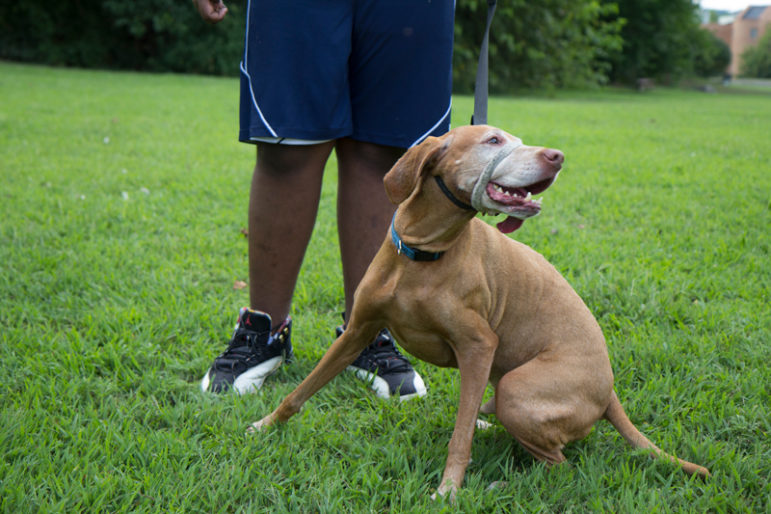Photos by Michael Tashji
NEW YORK — New York City teenagers who have been in trouble with the law are receiving help from some unlikely allies this summer — dogs. Rising Ground, a human services organization, is using therapy dog training to help teach young men how to take on adulthood.
“What is beautiful about the dog therapy is that it’s an avenue where we can get the kids to project their emotions onto the animals. We’re able to get through to them therapeutically a lot quicker,” said Lisa Crook, who is vice president, justice for youth and families programs, at Rising Ground in Yonkers, NY. “Say the dog is anxious around this new setting — then it is easier for the kids to say ‘I’m feeling anxious and never been placed away from my home.’”
 More than a dozen boys are participating in the new program, teaching the dogs to walk, heel, sit and stay. On this day, in the fifth week of an eight-week program, the teens doled out treats as a reward for good behavior.
More than a dozen boys are participating in the new program, teaching the dogs to walk, heel, sit and stay. On this day, in the fifth week of an eight-week program, the teens doled out treats as a reward for good behavior.
“I saw Murphy grow a lot with you guys,” said Barbara Haynes, a child psychologist who has been with the center for three years. “He was able to calm down when you asked him to — he was really listening to you guys.”
The teens were put in out-of-home placement by a New York City Family Court judge after delinquent activity. The dog therapy program is designed to help them cope with their residential placement.
They stay in residence for six to seven months and learn life skills while remaining close to their families and their communities. They get vocational training, receive counseling and peer support, and take trips outside the city to places like Bear Mountain State Park, N.Y.
“One thing I’d like you guys to think about is, where the dogs started at when you guys started training them, and then where they’re at now,” said Oliver Martell, a vocational and educational coordinator at Rising Ground. “Think about how you can relate that to your life — how you started out when you came into the program, and then where you’re at now.”
The dogs were expected to learn and grow too — the program is intended to train them to become certified therapy dogs. Josh Abolt, a master dog trainer and owner of Backcountry K-9 Training, will test the dogs at the end of the eight-week program and certify them if they are fully trained.
The teens — Dennis, Stanley, Rasheen, Mekhi, Joshua and the rest — took turns training Simon, a 6-year-old Yorkshire terrier, and Murphy, a 10-year-old Vizsla, stopping only to hydrate under the scorching sun.
“Simon was scared, and now he got comfortable with us like how we got comfortable with the program,” said Luis, one of the participating teens. “Then he started learning — using treats — and he started building relationships with us.”
Abolt, in addition to certifying therapy dogs, also trains police dogs. After putting on a bite suit and moving downfield, he brought out Dallas, a 2-year-old pit bull mix. Using commands spoken in German — “fass” for bite, “aus” for release — Abolt demonstrated the strict discipline required in the effective use of police dogs.
Crook said the therapy dog program, and the residential placement program as a whole, has been very successful. “Arrests overall in the state have been down. I think that the less kids we have in out-of-home placement, the better. We’re seeing less and less kids placed with us every day. The faster we can work ourselves out of a job, the better.”































